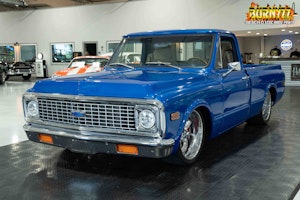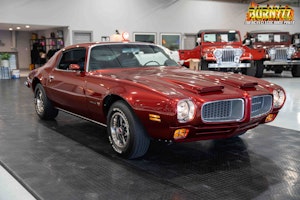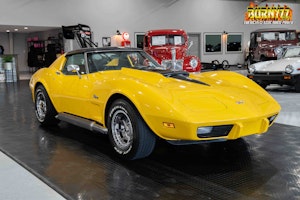Media | Articles
Auction Car Didn’t Meet Reserve? Data Suggest This Is the Best Way to Relist It.
Listing a classic car for sale through an online auction is exciting. It can also be nerve-wracking and, in the end, disappointing. But even if bidding doesn’t take off as expected and your car doesn’t meet the reserve price you set, that doesn’t quite mean you’re all the way back at square one. On the contrary, you’ve already taken the photos, done the prep work, and gathered all the relevant info.
What’s even better is that simply relisting it at no reserve (which means it sells no matter what the high bid is) has a very good chance of attracting higher bidding the second time around. That’s what we discovered when we looked at the data for online auctions where cars failed to sell, then were relisted by the same user within 300 days.
Plenty of psychology and strategy go into auctions. The reasons why aren’t entirely clear, but when a car fails to sell in an online auction, giving bidders a second bite at the apple and dangling “No Reserve” above it apparently excites them. Doing it quickly increases the chance of success, as 79 percent of vehicles relisted at no reserve within 30 days brought a greater high bid the second time around. That success rate generally decreases the longer you wait.
Adding a reserve the second time around generally has a lower chance of getting higher offers. Perhaps some bidders see such a repeat listing and think “it didn’t meet reserve last time around, so it probably won’t this time around, either.” Meanwhile, if they see a repeat listing at no reserve, they know the car must go to a new home and that the seller is motivated. They may even think the seller is eager or desperate, and think they have a good chance of bidding low and getting a deal when, ironically, they’re statistically less likely to get a deal.
You know what they say—if at first you don’t succeed, try, try again. It’s good life advice, but the data suggest it works in the world of selling cars via computer screen, too.
Marketplace
Buy and sell classics with confidence











Auction are a gamble and no reserve is high risk gambles unless you have a very high demand car.
A lot of this depends on the car and what suction.
Some auction cater to some cars better also the events tied to them.
I would love to know what auctions were used to compile this data viz seeing as there are massive shifts in audience size between auctions. If listing initially on a smaller online auction, even a local online auction with a reserve you’re going to have less of a chance of finding the right buyer among that audience. If listing it NR on Barrett-Jackson, Mecum, or BaT, you’re going to have thousands of additional eyes on there second auction so the difference may be partially due to audience size as well.
I do wonder how much the one the almost got away factor of something being relisted and getting a second crack might result in more money being made if it had sold on round one.
I’ll bet most reserves are set too high.
People who spend more on fixing up the car than the car is worth mostly do the reserve auctions and hope there is a person out there who feels their pain. So many reserve or no reserve auctions have the price driven up past what the car is worth. The market is the market and those who put their car up for auction are appreciated as they fill space on the website.
OF COURSE! The Auction Site only collects the commission from the buyer if the car SELLS! So of course all of them encourage “No Reserve”. Very self-serving, as it guarantees their commission. The other side? I was convinced to do this on a project that I knew I would ever complete. It sold for exactly half of the appraised / insured value. And I HAD to let it go. A word of CAUTION – Be VERY CAREFUL!
If it sold for half of the appraised value, your appraiser sucks.
Couldn’t agree more with you.
I hate to pick on one site in particular, but BAT is by far the worst for insisting on NR.
Quite frankly it is all well and good to guarantee making up the difference between a final bid and the Reserve – but if they won’t accept a reserve it smacks of being downright manipulative and arrogant!
I did a study of one particular car I wanted to list on BAT, and discovered that they were only accepting Reserve if it was an “Alumni” member or a dealer – talk about manipulative, and downright dishonest !
So what it amounts to if you are a private seller trying to protect you investment, then they treat you like a common pleb !
Its got worse over the years too …..
Very manipulative auctioneer ……
Somewhat related – reporting high bids where reserve is not met is useless. At live auctions one is likely never really going to know when the high bid was real or something the auctioneer made up in hopes of being out-bid, and yes, the practice is legal when a reserve is at play. When it’s an online auction, it is sometimes obvious that the high bid that didn’t meet reserve was placed by a shill. And one well-known auction company won’t go to BAT to stop this practice . . .
Part of the problem today is owners / sellers still think it’s July 2022 – the height of bubble pricing. They may have bought during the bubble, so they bought at an inflated price and it was a time of price appreciation. Not anymore. Until sellers understand the bubble has burst and prices have dropped, they’re going to be stuck with their depreciating asset.
I get frustrated after bidding, being beaten, bidding again only to find out none of us met the reserve. I haven’t figured out the psychology of the no bid listing person. Is it out of desperation, just wanting to unload the item listed, or what. I wish more people would post the reserve needing to be met. I would then know if I’m in the game price-wise and whether I would jump into the fray.
My understanding of reserve is that is it not meant to be public. I could be wrong, but I don’t recall of any place that lists that reserve number. Either way, if a car doesn’t sell, I think that is a case of the seller not being motivated enough to sell it, or the auction company needing to work harder to set an attainable reserve with them. I think buyers dictate the market when they place a bid, if the sellers actually want to set their car loose, they need to get with the program.
This is baloney statistics. The data presented do not include what the actual reserve number was versus the actual sell number was under No Reserve conditions. Nor does it break down data by more valuable versus less valuable cars.
there is a simple answer do not use a company who is not fair or honest about the ture selling price at auction which is going to be less than you want.
Reserve is never announced before it’s reached, otherwise it would simply become the opening bid. The seller’s hope is excitement will build as bidders know they’re throwing numbers out that won’t cost them anything – until “reserve met” is announced, and hopefully the excitement will have taken over reason. If you offer at no reserve you’d better be ready to give it away. Wise bidders buy at auction for a good deal, not to pay what it’s worth. Reckless bidders can often find a way to back out.